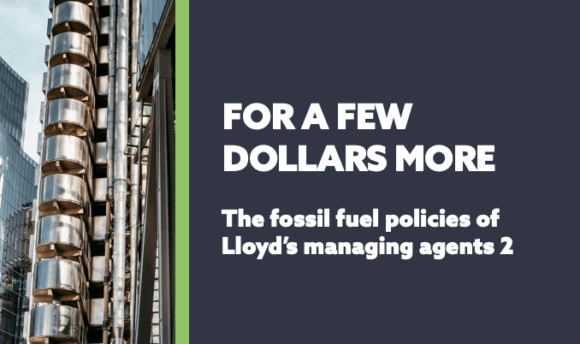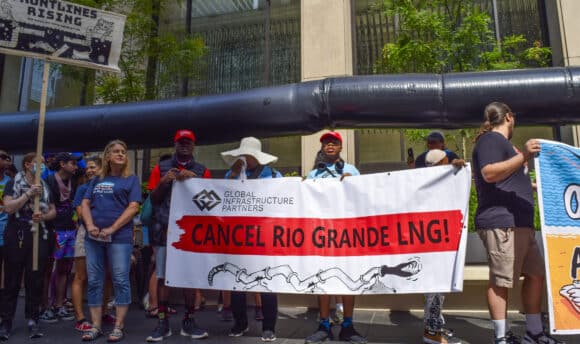New report argues UK insurance sector currently facilitates the climate crisis but with bold reform it can play a key role in delivering a safe climate pathway
- By supporting the continuation of extraction and emissions, the insurance industry plays a central role in facilitating economic activity that fuels climate and environmental breakdown.
- The UK plays a pivotal part in global insurance, not least through Lloyd’s of London. Lloyd’s market is estimated to have accounted for approximately 40 percent of the total global energy insurance premium in 2018. [1]
- Through investment in and coverage of fossil fuel assets, the industry generates compounding financial stability and solvency risks.
The report, ‘Insuring Against Climate Catastrophe’, sets out that by continuing to support carbon-intensive projects and firms, the insurance industry is not only actively fuelling the existential threat of climate breakdown, but also throwing the future of their own industry into danger.
Last week, campaigners gathered outside Lloyd’s of London’s headquarters to call out its role in climate and environmental breakdown, demanding rapid decarbonisation and a reparative pathway for the industry. [2] While pressure on the industry has led to important wins, the insurance sector still has a long way to go.
The report follows the 2021 Scorecard on Insurance, Fossil Fuels and Climate Change by the Insure our Future campaign. The findings map 30 leading primary insurers and reinsurers, uncovering that only three insurers – France’s AXA, Italy’s Generali, and Australia’s Suncorp – have adopted policies to stop insurance for much or all new oil and gas production projects.
Common Wealth’s latest report notes that despite the existential threat posed by climate breakdown, efforts from the industry have often focussed on enhancing ways to model risks, rather than addressing the inherent risks of a model rooted in private short-term interests of carbon-intensive capital allocation and the dangers it poses to our collective future.
Recommendations
- Aligning insurance coverage with a 1.5°C pathway: Alongside an immediate end to coverage of new coal, oil and gas exploration and production, firms should implement a phase out of existing coal, oil, and gas insurance coverage in line with a 1.5°C pathway. Before providing coverage or renewals, insurers should necessitate insureds have a codified, monitored and reported on 1.5°C aligned decarbonisation strategy.
- Integrating sustainability into regulation: The divestment from carbon-intensive projects, assets and fossil fuel sectors should be overseen by UK regulators, mandating the operations of insurers and reinsurers to conduct future underwriting in line within the limits set by a 1.5°C pathway.
- Enhancing transparency: There is a need for public, readily accessible details surrounding insurance and insurance policies to provide a more thorough grasp of who has accountability and when, allow for scrutiny of comprehensive risk assessments – both with regards to climate and environmental impacts and workers’ safety – and, crucially, knowledge of who pays, at what point, and why.
- Repealing and replacing the UK Lobbying Act to challenge corporate power: Repealing the 2014 Lobbying Act and replacing it with a new Act is vital to rebalance power between corporate, for-profit voices and those championing climate and environmental justice, as well as enhancing transparency and accountability.
“The drive to fundamentally shift the operations of the insurance industry is first and foremost a moral one. The consequences of inaction, or slow-moving action, are deadly. A reordering of the insurance sector is urgently needed to ensure it no longer invests in or facilitates activities that are worsening the climate crisis and instead shifts rapidly toward 1.5 degrees alignment in how it insures and invests. As the host nation of COP26 and a global insurance hub, the UK has a unique opportunity to demonstrate leadership, fundamentally shifting the operations of the insurance industry by rewiring our regulatory frameworks.”



